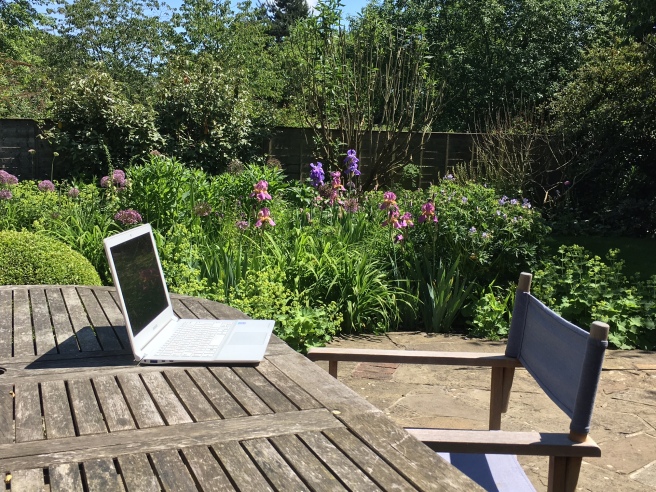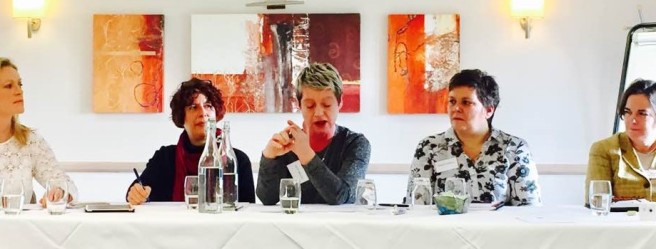Themes from the ELT Freelancers’ Awayday 2018
https://emilyhirdblog.wordpress.com/2018/02/01/themes-from-the-elt-freelancers-awayday-2018/
Themes from the ELT Freelancers’ Awayday 2018
https://emilyhirdblog.wordpress.com/2018/02/01/themes-from-the-elt-freelancers-awayday-2018/
With my ELT Teacher 2 Writer colleagues, I’m proud to have made a contribution to this great cause. Please consider bidding on any of the great items in the auction.
 It’s been a while since I posted here, but I’m glad to be back with this list of FAQs that I’ve heard time and again since starting to freelance from home.
It’s been a while since I posted here, but I’m glad to be back with this list of FAQs that I’ve heard time and again since starting to freelance from home.
Have you been out in the sun much this week?
Has the weather been good? I did open the window in my office because it felt a bit stuffy, but I’ve been focusing on proofs this week so haven’t really been out of the house. I’ve had the cardi on the back of my chair on and off the same amount as usual. And don’t suggest I work in the garden. The sun glares off my laptop screen, papers go all over the place in the slightest breeze, and our garden chairs make my back ache.
Don’t you get lonely?
No, I’ve got Facebook, Twitter and Skype. I spend several hours each week on all of them (a bit less on Twitter), and put the radio on when I go downstairs for lunch. I go to the gym most days and have a good chat with my friends there, or meet friends for a walk round the block, but when I’m working, I’m concentrating. And although I left an office job where I was managing a team, since we moved to a small village and I’ve worked from home, I’ve realized I actually enjoy my own company quite a lot.
I bet you like working in your pyjamas, no?
No! I get dressed every day before I start work. It might only be in gym kit/comfy stuff, and it doesn’t involve shoes, make-up or blow-drying my hair, but I’m a professional, and feel a bit slobby in my PJs so it helps me focus if I’m in actual clothes.
Do you have to be really disciplined?
Yes! I have bills to pay! If I wasn’t disciplined, I would miss deadlines. I wouldn’t get offered new work. I wouldn’t earn any money. I wouldn’t be able to eat. And I love eating!
Do you fancy coffee on Wednesday?
Yes, I do. I always fancy coffee (and cake). But next Wednesday I’ll get up, do my usual social media for three organisations, go to my regular gym class, come home for a project meeting, then get on with the project. Then it will be time for a quick lunch, after which I’ll do more project work (remember the deadlines), and do another project call when my colleague in San Francisco gets to her desk at 4.30pm my time. So not much time for coffee, I’m afraid. Let’s book something for next month and I’ll plan around it.
Don’t you miss working in an office?
Sometimes I miss the social side of it. But on the whole, I save myself three hours of commuting time every day (and the related costs), I’m more productive with not having to go to meetings every couple of hours, and I always hated office politics. My waistline has probably benefited from eating fewer birthday cakes, I don’t have to listen to others’ conversations with banks/letting agents/parents, and I’m sure there are fewer germs circulating round my house than are in the average office aircon system.
What do you do if you have an IT problem?
I have no hesitation in asking my husband for help. If he can’t sort it out, I’ll Google or ask friends on Facebook. I’ve only ever needed to pay for IT help once in eight years, and that was to get the inside of my PC cleaned. (Thanks to Rob from Rascom for that. TOTALLY recommended – see photos.)
How many hours a week do you work?
Probably more than most office workers, if you count actual hours worked rather than hours out of the house. As I’ve said, working from home alone is, in my experience, way more productive than working in an office, so I get a lot done, in fewer hours than it would take someone working in house. I aim for 5–6 billable hours each day, but of course that varies. When I have to, I work late in the evenings and at weekends, and sometimes I take a few hours out to get my hair done. But I didn’t go freelance to work less – I did it for a different way of life.
I bet you love the flexibility, don’t you?
Yes, I do. That’s the whole point of freelancing. I can choose the projects I take on, the clients I work for, and where I focus my time. It allows me to do the bread-and-butter project management and editing jobs, but also to pursue projects of my own, like the ELT Freelancers’ Awaydays, ELT Teacher 2 Writer, and my role on the MaWSIG committee. I’m really proud of my contributions to all of those, and if it means I can get round the supermarket at the point in the week when it’s quietest, even better.
Does the fridge talk to you?
No. I’ve tuned it out so I can’t hear its calls any more. The same goes for the biscuit tin. I shut my door, get on with my work, and ignore them. It’s the only way.
I could go on, but I’ve just noticed that the sun is shining and it’s Friday afternoon. One more short report to write and a Skype call, then I’ll log off. Freelancers, eh!
What other questions do you get asked? What’s the funniest one you’ve heard?

Panelists (l to r) Karen White, Dona Velluti, Katy Wright, Denise Cowle, Rachel Brushfield (and thanks to Nicola Gardner for the photo)
It’s something of an annual event now, and I’ve found myself saying ‘see you next year’ to more than one person in the last week! The third ELT Freelancers’ Awayday, aimed mainly at freelance editors in our field, was a day of discussion, networking, sharing and learning from each other, held in Oxford at the end of January. Almost 100 people came; one from Canada, several from Spain, at least one from Greece, and the rest from all points of the UK. Chuffed doesn’t begin to describe how Helen and I feel to have started this event and built it into something that’s growing each year.
I know I’m the person who comes the furthest to these events, but it’s worth every cent. I haven’t got this kind of community where I live (Canada is a bit of an ELT publishing backwater), so this is really valuable to me. Tania Pattison
Emily Hird has already blogged about her impressions of the day, there is a comprehensive Storify of #FreeELT and photos on our website, so I’m not going to recount the whole event, but I did want to summarise the panel discussion that opened the day. Before I do, I’d like to send huge thanks to Becky Jones for having minuted the whole thing in fantastic detail.
Having carried out a survey on ELT freelance rates earlier in the year and comparing the results with the survey we’d done in 2013, we had noted that there seemed to be some stagnation in rates which, when you consider that we all have an additional three years’ experience, and inflation and the cost of living have gone up in that time, seemed slightly surprising. What’s caused this? More freelancers on the market, so some undercutting of rates? Less publishing, so less work to go around, so work is being offered to those asking lower rates? Publishers cutting costs, so looking for the cheapest rate for the job? We really weren’t sure, so decided to set rates, and how to negotiate better ones, as the topic for the panel discussion. With the exception of Rachel, who specialises in supporting sole-traders and those wishing to develop portfolio careers, our speakers all came from editorial backgrounds and I chaired it. (Read about Katy and Dona here. Denise kindly stepped in at short notice and brought her knowledge of the SfEP and its suggested minimum rates to the table.)
I loved the forum at the start with really interesting input and discussion. Jemma Hillyer
Opening with a question about how redundancies and restructures within the publishers have affected us and what we can do about it, Katy, who’s currently working on an in-house contract having been freelancing for a number of years, told us about the changes she’s noticed since she was last employed in house. Her observations included the fact that even though print products are still high on the agenda for many markets, with the rise of hugely expensive digital products which return comparatively little, budgets and schedules are being cut right back, as are in-house staffing levels, meaning that there is more reliance than ever on freelancers. (That’s good, right?) But they want the freelancers to be quick, cheap, reliable, experienced … And – here comes one of the big takeaways from the day – echoed by the presentation from Pearson in the afternoon, there is a rise in the popularity of packaging, where one ‘preferred vendor’ is used to resource editorial, media and design elements of a project, often from an offshore base. The advantage of this business model to the publisher is that the packager will take a multi-level, multi-component course and manage and resource it with the minimum of hands-on work being required from the skeleton staff back at the publisher’s HQ, and quite likely more quickly and at a lower cost than it could be done using the traditional hourly rate freelance model. (That’s not so good.)
Denise, responding with her SfEP experience then reminded everyone that the key thing for us to remember is that we must not undervalue what we do, and the experience and training we have, by losing the confidence to charge reasonable rates. (The 2016 rates survey results showed that over 50% of responses were from people with over 15 years’ experience of editorial work.) Dona agreed that if we don’t do this, and undercut each other, we will ultimately be undercutting ourselves in a race to the bottom. An additional thing to bear in mind is that if a lot of the editors with the most experience are out of house, that’s also where the most knowledge of what a job is going to (really) involve, how long it’s going to take, and what similar jobs have taken in the past, so it’s not uncommon to find that a project that’s briefed to take 50 hours suffers from scope-creep and can take considerably longer, which is where the negotiation skills are required to ensure we’re being paid for the work we’re actually doing.
With her non-ELT background, but plenty of experience in working with other business owners (note to all of us to remember that this is how we must view ourselves), Rachel gave us some tips on keeping ahead of trends in the world of work, particularly now that the whole world is your competitor. You need to be a specialist. You need to know what makes you different and better than others. You need to be good at marketing – yourself and your business. (Have you thought about using Twitter for this? I’m running a workshop in March which might be of interest.) You need to work out how you can add value and be the go-to person that the commissioning editor or project manager calls first. You need to know how you can make their life easier. You need to be able to tell them what problems you can solve for them. You also need to know how much you want to do the job you’re being offered. You need to decide a minimum rate below which you will not go. You need to know when to say no. Denise also suggests looking outside the world of ELT to see what’s happening with working practices in other areas of publishing.
Before we opened up to the floor for questions, Katy gave the room some more very practical advice about what in-house project managers are looking for in a freelancer. I don’t think there’s anything startlingly new here, but if we want to remain competitive, this is advice worth heeding:
To conclude then, I think there are several key points arising from the panel discussion (and from other parts of the day):
Were you at the Awayday? Did you draw any other conclusions from the panel discussion, or the rest of the day? Share your thoughts in the Comments.
See you next year!
Thank you so much, Karen and Helen, for a wonderful, informative and inspiring day yesterday. Already looking forward to next year. Penny Hands
Friday January 27th saw the third ELT Freelancers’ Awayday in Oxford, organised by Karen White and Helen Holwill. It was my first, so I thought it worth recording my impressions of the day. I’d be interested to hear what others took away!
People
The event was very well attended, with around a hundred participants, I believe. It was an environment highly conducive to networking and every break was abuzz with loud chatter. A few things struck me about this:
View original post 585 more words
Back at my desk for the first time this year, I thought I’d jot down some personal and work-related plans for 2017. If nothing else, I’ll have something to look back at in a year’s time and chuckle at!
Keep going with the things I enjoyed last year
Personal 2016 was the year I discovered hula hooping, using a Fitbit, and MyFitnessPal. I put diary appointments in for gym classes and prioritised them. As a result, I ended the year two dress sizes smaller and a couple of stone lighter than I started it. It took a bit of time to form habits for these things, but the self-confidence and positivity I’ve felt as a result have filtered through into all areas of my life and I’ll be making sure to keep all of them up in 2017.
Work I also discovered WordPress properly last year. Not just for writing this blog, but for following others. I follow blogs about ELT, writing, editing, and freelancing (as well as some about fitness, motorhome life and personal friends). I tend to update my feed on a Saturday morning and catch up on everything over the weekend. I know it’s one more online element to keep up with, but it’s one of the most useful from a CPD perspective.
Branch out more
Personal We’ve just bought a motorhome after a long time thinking and talking about it. If we’re going to get value for money from it, we’ll be away as many weekends as possible. Getting out of our comfort zone and trying new things is all part of the plan, and I can’t wait.
Work I blogged about diversifying last year when it seemed as though there were a number of editors in my network who were a bit low on work and some were turning to other sources of income. I’ve already fixed a meeting with a friend to help her with her new business social media, and this is something I’m actively planning to do more of.
Waste less time on social media
Personal Who hasn’t got this in their list of resolutions for the year? I would like to be able to look back on 2017 as the year I read fewer Facebook posts, tweets and Instagram captions and more books. (Despite what I’ve said above – not sure this is going to work out!) I’m always amazed when friends tell me they’ve read more than the set bookclub title in a month, but actually I used to do that too. If I took the iPad off the kitchen table and put my Kindle there instead, I might do more ‘useful’ reading at lunchtimes. We’ll see …
Work I’m working with an author who uses a plugin to block specified websites during work hours. I should probably do this too, as well as turning off all phone alerts – setting it to silent isn’t enough. It’s distracting, and I’m sure the number of times I read anything useful in a day could be counted on a single hand. I resolve to use social media to my advantage, not on an all-day basis. (Update – I’ve had my phone on Airplane mode today. Worked a treat. Will be doing that more regularly.)
Keep in touch
Personal 2017 will be the year I focus on relationships I value, nurture new ones, and stop wasting energy on others. Down-time is precious, so it’s crucial to spend it wisely. This might not be the easiest one to stick to, but I’m going to have a go.
Work On the whole, I consider myself a pretty good networker and have blogged about that on more than one occasion. Last year I stepped it up a notch by going to the SfEP conference for the first time and meeting in person lots of people I’d previously only met online. It was a great experience and I’m determined to do more of that sort of thing this year. I will also do my best to attend the monthly meeting of my local networking group. There is so much to be said for talking face-to-face when we spend so much of our time alone with only our screens for company.
Let things go
Personal Stuff I haven’t used for ages, clothes I don’t wear, general clutter. All going in the bin/to the charity shop/on eBay. Good practice for more prolonged motorhome living in the future maybe!
Work Worry about project-related issues when I’ve left my desk, self-imposed deadlines that have passed, people who don’t return emails. All going in the same bin.
What are your plans for the year? Let’s come back here in 12 months’ time and see how far we got. Wishing you a very successful 2017, whatever you do.

 This month’s blog post is over on BookMachine …
This month’s blog post is over on BookMachine …15 December 2016: MaWSIG Christmas Party (UK) Deck the halls with boughs of holly … Welcome in the festive season with fellow ELT editors, authors and publishers at the MaWSIG Christmas Party on Thursday 15th December in Oxford. Pit your wits against the best brains in ELT in our Christmas quiz! Catch up with friends…
via Book tickets for a MaWSIG Christmas and New Year! — MaWSIG
Much as I’d like to write a post about my October holiday which kept me away from the blog last month, I think something more work-related might be in order. But let me just recommend South Africa as a great place to visit if you like food, drink, being outdoors and wildlife. I’ll settle for using a photo that might just look like it fits the topic and move swiftly on.
Repacking my suitcase, I headed to Munich last weekend with my ELT Teacher 2 Writer colleagues for the IATEFL BESIG conference (for teachers in the business English teaching community), where I met up with my co-committee members from MaWSIG (the IATEFL special interest group for materials writers). I’ve always got my White Ink hat on as well, of course. I love this kind of event where teachers, writers, editors and publishers come together and have an opportunity to learn from each other. This year MaWSIG was co-hosting the conference with BESIG for the first time, so there was a strand of talks with materials writing at their heart running throughout the weekend. Talks ranged from experienced authors offering practical tips for writers, whether they’re writing materials for their own class or for wider publication, to first-time writers sharing their experiences of the writing-editing-publication process.
I listened to all the talks in the MaWSIG strand and noticed a common theme emerging. Negotiation.
In their talk, Mandy Welfare and Dale Coulter offered a selection of tips for new writers, and participants were asked to stick stickers on the pieces of advice they agreed with most. At the end of the session, the advice with the most stickers was the one advising writers [working for a publisher] to negotiate on fees if they seem low. One participant voiced surprise about the fact that any negotiation was possible. The immediate response from the rest of the room was ‘you at least have to ask’.
Andy Johnson, who has worked as a teacher, materials writer and materials editor at The London School of English, offered insights into his experiences in both authoring and editing roles. Negotiating featured in several of his tips for both sides. Remember that the brief is dynamic and open to negotiation. In a context where materials are being written for a specific course at one school, there is likely to be more flexibility than if you are writing for a publisher. And, if elements of the brief are causing difficulty, the writer can ask the editor if anything can change – some things may be ‘must haves’, others might be ‘nice to haves’. Andy also talked about the importance of dates and fees being open to negotiation. An interesting way his school has worked with writers is by thinking more creatively than just in terms of fees or hourly rates. Negotiations have been done over teaching hours, shared copyright arrangements and royalties.
The BESIG conference took place shortly after I’d had a conversation with another freelance editor about a fixed fee job that was turning out to need a lot more work than the fee was reasonable for, and we discussed how to negotiate a fairer deal that all parties felt happy with.
 As Andy Johnson said in his session in Munich, ELT editors and authors tend not to be experienced negotiators. Yet it’s a skill that is becoming increasingly important for us all – in-house staff as well as freelancers; authors, editors and publishers – so we can all feel we are being paid fairly for work done and time invested, whilst bearing the other party’s interests in mind.
As Andy Johnson said in his session in Munich, ELT editors and authors tend not to be experienced negotiators. Yet it’s a skill that is becoming increasingly important for us all – in-house staff as well as freelancers; authors, editors and publishers – so we can all feel we are being paid fairly for work done and time invested, whilst bearing the other party’s interests in mind.
Helen (Holwill, my friend and collaborator at ELT Freelancers) and I recognized this as we started to plan the 2017 ELT Freelancers’ Awayday. We’ll be aiming to address the issue head-on in our panel discussion on negotiation before Penny Hands talks about the author-editor relationship – I’m pretty sure that session will also feature the N-word.
So, if we all need to brush up our negotiating skills, where should we start? Here are three tips to bear in mind next time you have to discuss terms and conditions …
Have you had to negotiate over a project recently? How did it go? Do you have any tips to share in a Comment?